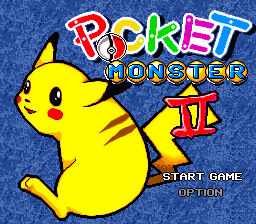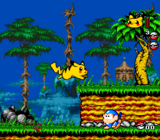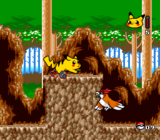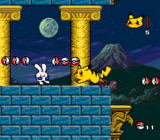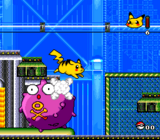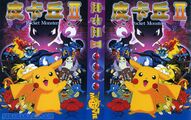Pocket Monster II
From Sega Retro
| Pocket Monster II | ||||||||||
|---|---|---|---|---|---|---|---|---|---|---|
| System(s): Sega Mega Drive | ||||||||||
| Publisher: X Boy (?) | ||||||||||
| Developer: Ex-Chuanpu (?) | ||||||||||
| Sound driver: Data East/High Seas Havoc | ||||||||||
| Genre: Action | ||||||||||
| Number of players: 1 | ||||||||||
|
Pocket Monster II, also known as Pikaqiu II (皮卡丘II)[1], is an unlicensed game for the Sega Mega Drive and a direct sequel to Pocket Monster. Like its prequel, it is based on Nintendo's Pokémon franchise, and is a platform game where the player controls Pikachu.
As a sequel, Pocket Monster II uses the same platforming engine as its predecessor and retains the same bugs.
Contents
Gameplay
Just like its prequel, Pocket Monster II has the player go through standard platforming fare across side-scrolling levels, though this time there are only four stages and only one boss which is fought at the end of the last stage. To make up for its short number of stages, the stages themselves are long in length and feature plenty of sections with leaps of faith as well as sections where missing a platform results in falling to an earlier part of the stage, and there are no checkpoints. Neither of the levels are named.
Pikachu is capable of moving with the D-Pad and jumping with the ![]() button. Instead of using electrical attacks, Pikachu can now throw Poké Balls as an alternate method of attacking enemies by pressing
button. Instead of using electrical attacks, Pikachu can now throw Poké Balls as an alternate method of attacking enemies by pressing ![]() . This can only be done while Pikachu is on the ground, and the Poké Balls' hitboxes are inconsistent, allowing them to make unexpected hits or misses. Defeated enemies will respawn when Pikachu moves away from their location and comes back.
. This can only be done while Pikachu is on the ground, and the Poké Balls' hitboxes are inconsistent, allowing them to make unexpected hits or misses. Defeated enemies will respawn when Pikachu moves away from their location and comes back.
Instead of a numerical value, Pikachu's health is represented by a gauge with 8 points in the top-right corner of the screen. Just like the first game, Pikachu has a set amount of lives and continues to beat the game, both of which can be set between 3 and 5 in the options menu, as well as a difficulty setting which affects how much Pikachu's health decreases from enemy attacks (1 point on Easy, 2 on Normal, 4 on Hard; spikes always deal 1 point of damage regardless of difficulty). Extra lives are plentiful and are respawned after death.
There are more enemies based on other Pokémon in the game, though enemy variety is smaller as enemies are shared across levels, and there are still enemies from other games such as Wonder Boy in Monster World, Mega Bomberman and Magical Taruruto-kun. The music is adapted from the Japanese Pokémon anime, such as the title screen and ending music which is based on the second Japanese ending theme "Nyarth no Uta" (Meowth's Song). Most sound effects are again in PCM format and taken from other games.
Items
| Poké Ball | |
|---|---|
| Can be thrown at enemies, and up to 99 can be carried. Taking damage from enemies will make Pikachu lose all of his Poké Balls. | |
| Candy | |
| Restores one point of Pikachu's health. | |
| Cake | |
| Fully restores Pikachu's health. | |
| Electric orb | |
| Makes Pikachu invincible to enemies for a few seconds. | |
| Pikachu icon | |
| Awards an extra life. |
Stages
| Stage 1 | |
|---|---|
| This stage appears to be a jungle stage that uses background graphics from The Misadventures of Flink, with various floating platforms and bridges for Pikachu to cross, and no bottomless pits to fall into, though there are spike beds that will cause damage if stepped on.
The music that plays here is based on "Mesaze Pokémon Master", the first Japanese opening theme of the anime. | |
| Stage 2 | |
| A forest/canyon stage which uses background and foreground graphics edited from Sting Chameleon's stage from Mega Man X, and features bottomless pits.
The music that plays here is based on "Hyakugojuuichi" (One Hundred Fifty-One), the first Japanese ending theme of the anime. | |
| Stage 3 | |
| A castle-themed stage which copies its foreground graphics and level design from the first section of Polterpink from Pink Goes to Hollywood. The exit to this stage is blocked off by an impassible wall of springs that will push Pikachu back, and the player must find and press a red button to remove them.
The music that plays here is based on "Oyasumi, Boku no Pikachu" (Goodnight, My Pikachu), a song from the Japanese anime that played in the episode "Pikachu's Goodbye". | |
| Stage 4 | |
| The final stage appears to be a power plant that copies its background and foreground graphics from the third stage of Sparkster for the Super NES. Upon reaching the end of the stage, Pikachu must fight the only boss in the game, a Koffing that rolls around and must be defeated by jumping on it or throwing Poké Balls at it.
This stage reuses the first stage's music, while the boss fight reuses the second stage's music. |
Magazine articles
- Main article: Pocket Monster II/Magazine articles.
Physical scans
| Sega Retro Average | |||||||||
|---|---|---|---|---|---|---|---|---|---|
|
| 30 | |
|---|---|
| Based on 1 review | |
| Mega Drive, TW (Re-release) |
|---|
|
Multi-cart appearances
No results
Technical information
- Main article: Pocket Monster II/Technical information.
References
- ↑ File:PocketMonsterII MD Box.jpg
- ↑ Cool Gamer, "9" (RU; 2002-10-13), page 159
| Pocket Monster II | |
|---|---|
|
Main page | Comparisons | Maps | Hidden content | Bugs | Magazine articles | Reception | Region coding | Technical information | |
| Print Club Pokémon B (1999) | Pokémon Corogarena (2022) | |
| Pocket Monsters Suuji o Tsukamaeyou! (2002) | Pocket Monsters Advanced Generation Hiragana Katakana Kakechatta! (2004) | Pocket Monsters Advanced Generation Minna de Pico Pokémon Waiwai Battle! (2004) | |
| Pocket Monsters Advanced Generation Pokémon Suuji Battle!! (2005) | Chiiku Drill Pocket Monsters Diamond & Pearl: Moji Kazu Chie Asobi (2007) | Pocket Monsters Diamond & Pearl Pokémon o Sagase! Meiro de Daibouken! (2009) | Pocket Monsters Best Wishes! Chinou Ikusei Pokémon Daiundoukai (2010) | |
| Unlicensed Pokémon games for Sega systems | |
| Pocket Monster (1999) | Pokemon Stadium (2000) | Pocket Monster II (2001) | Pokemon Crazy Drummer (2002) | Pokémon II (2002) | |
